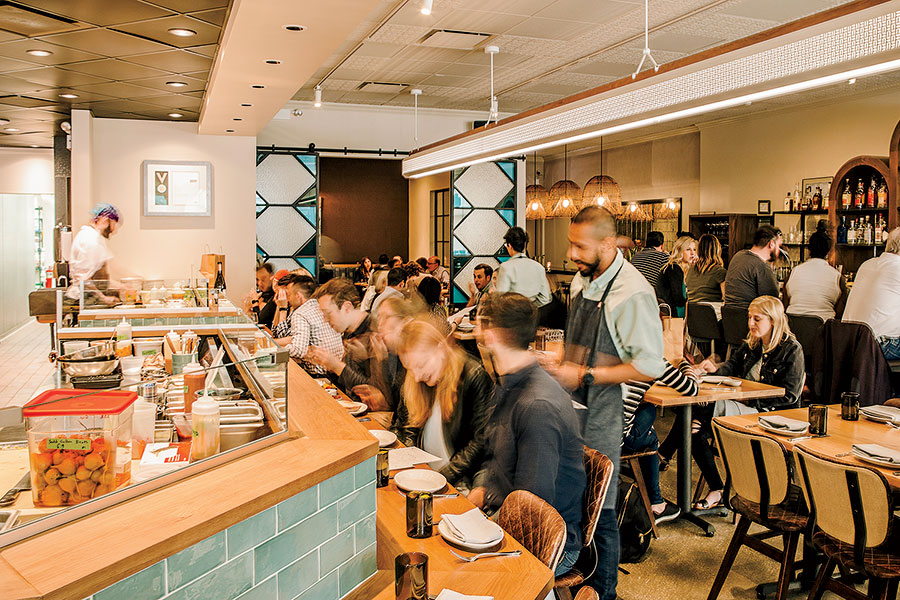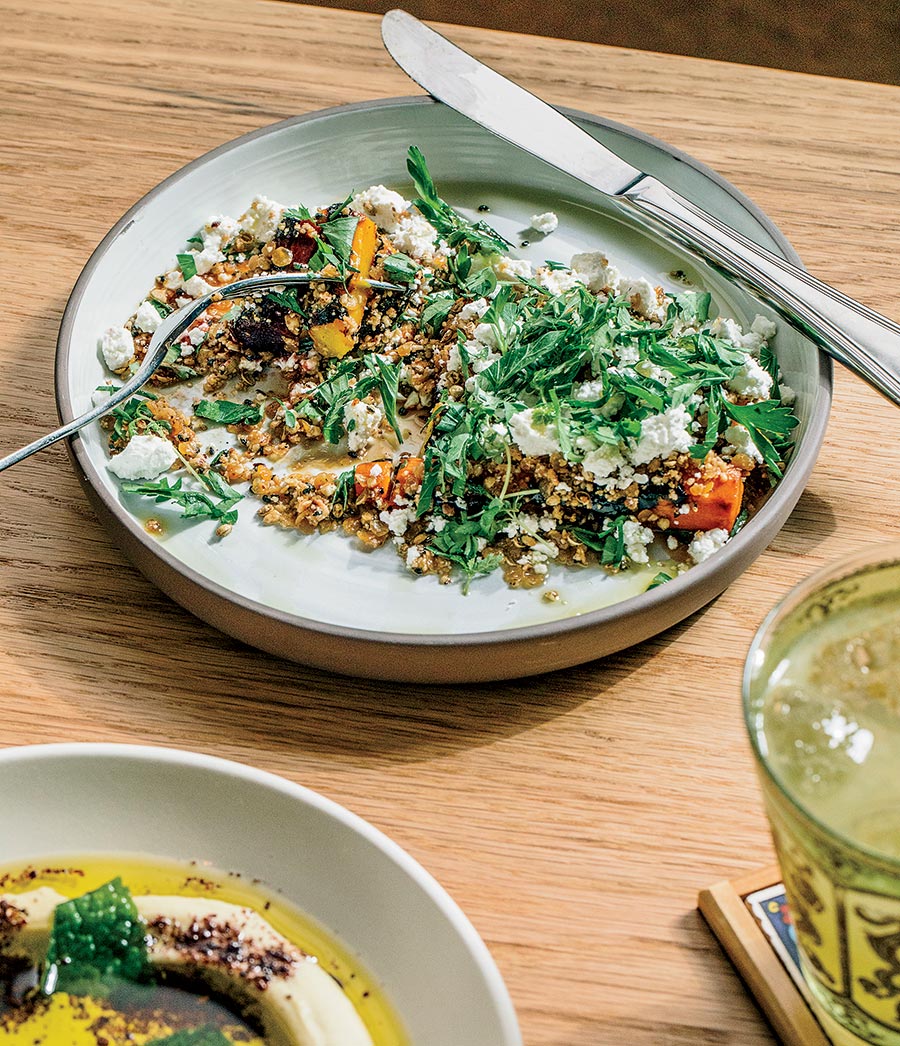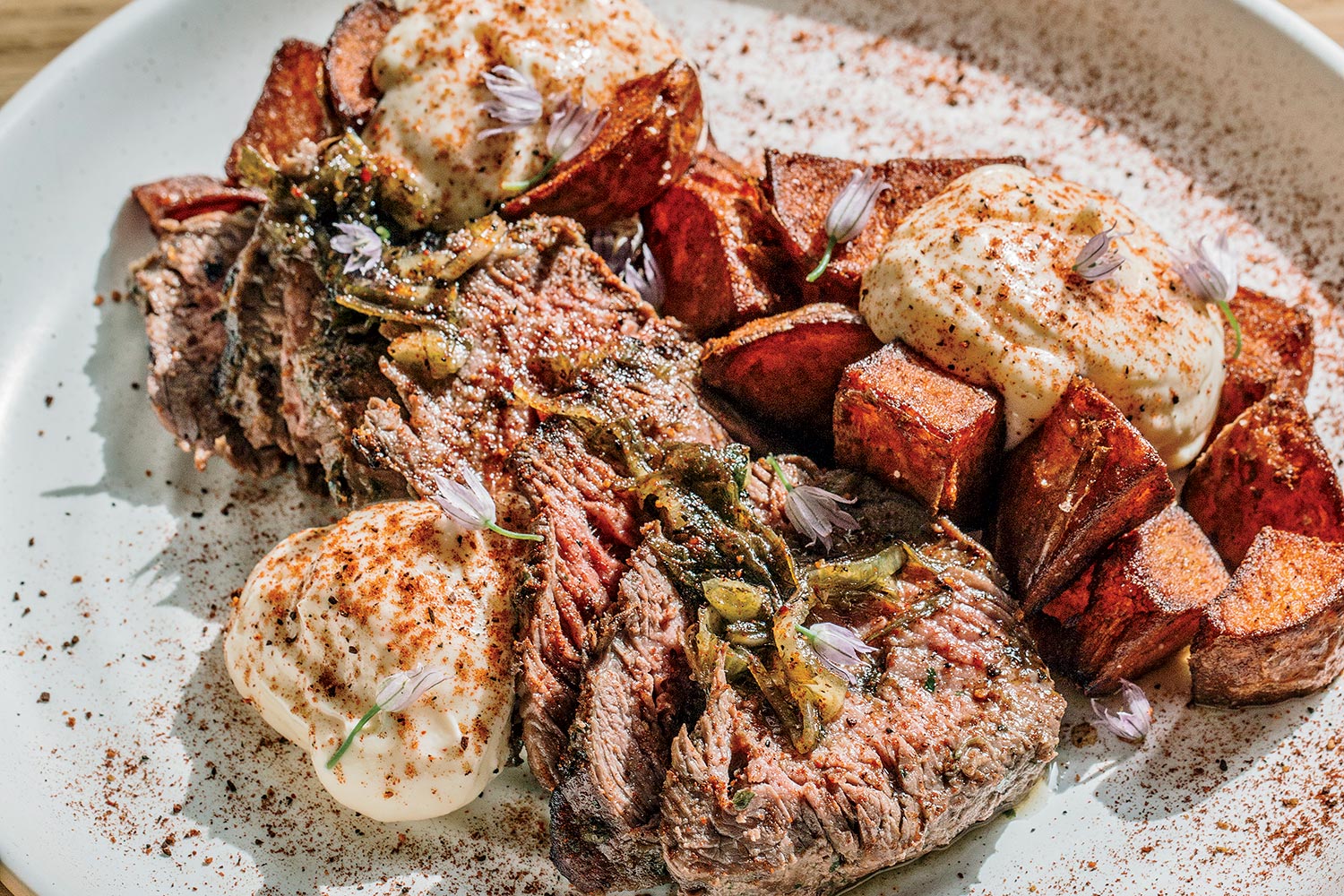While I was on vacation in Israel sometime between Y2K and 9/11, my travel companion tried to coax a marriage proposal out of me. I wasn’t ready. We’d spent the previous 10 days in a haze of labneh and young lust, eating our way from Eilat to Rosh Hanikra to the Haifa bus station revered for its shawarma. But now we sat in silence, deadlocked over differing emotional timelines and a plate of falafel in a sun-soaked pedestrian mall on Ben Yehuda Street. She was probably thinking: Oh Lord, he can’t commit. I was thinking about the oily falafel dripping tahini down my arm.
I was reminded of this night a few weeks back while having dinner at Galit, a sleek new Israeli restaurant in Lincoln Park. The falafel here is crispy and perfect, served with Persian pickled turnips and funky fermented mango. Instead of paying a handful of shekels for the privilege of eating my falafel al fresco, I paid $12 for this version, which was made by a James Beard Award–winning chef who is part of a growing national community of cooks exploring Israeli cuisine. The country’s food traditions have spread to mainstream America with cookbooks such as Yotam Ottolenghi and Sami Tamimi’s Jerusalem in 2011 and through beloved restaurants like Shaya in New Orleans and Zahav in Philadelphia. Now people are learning the joys of spicy Yemeni carrots, Moroccan matbucha salads, and Romanian minced beef kebabs. We’re waking up to the fact that Israel’s fresh cuisine integrates multiple cultures, continents, and centuries — as well as shawarma at a bus station.
Galit finds itself at the crest of this wave. Chef-partner Zach Engel, who cooked at both Shaya and Zahav, teamed up with Andrés Clavero, a Cuban Palestinian veteran of Nico Osteria, to open Galit in April. They were so certain their collaboration was the right restaurant at the right time that one week before it opened, Engel told Forbes, “I don’t want to be the restaurant people can’t access because it’s too busy.”

Dude was right about the crowds. Trying to land a reservation before 9 p.m. is sheer folly. On our visit, the shiny space — all mosaic glass doors and pendant lighting — was more stuffed than a Balkan cabbage. The zinc bar spilled over with people, as did the counter wrapping around the open kitchen. The only uninhabited space may have been the inside of the eight-foot-wide charcoal hearth. The overall vibe was more frenzied than warm or inviting.
But then we got to the food. The menu covers tons of ground — Iraqi kubba halab, Yemeni pickles, a foie gras au torchon with sour cherry to spread on challah. Engel knows when to tweak familiar stuff and when to present dishes in all their simple glory, as in his four hummus options: One mixes trumpet mushrooms and gribenes (chicken cracklings); another cradles cinnamony brisket. But there’s also a straight-up tahini hummus with, to quote the menu, “way too much olive oil.”
At the beginning of the meal, I was reminded of another trip to Israel, this one more recent: a Shabbat dinner at a cousin’s apartment in Jerusalem, where the wine kept coming, three generations of cousins beat me at Ping-Pong with their nondominant hands, and the dinner table overflowed with amazing salatim (the collection of salads, dips, and spreads that starts any proper Israeli meal) and hilariously blunt conversation in multiple languages. Galit’s salatim fill you with that same sense of warmth and welcoming. You can order five for $22, and you’ll find yourself with bright pickled cauliflowers and onions; labneh tinged with hyssop; a spicy Turkish ezme spread of tomatoes and peppers. Of course, all of this would be pointless without good pita to dip and fold, and Galit’s — which arrives still hot from the hearth — is a thing of beauty. Puffy and leopard-spotted, it’s got more craters than an English muffin.

The menu’s many vegetables burst with confidence. Wood-roasted asparagus gets an acid jolt from barberries and a mellow crunch from pecans; cumin-glazed carrots hold their own under clouds of feta and a sprinkle of hazelnut dukka. Shakshuka, that northern African standby in which eggs are poached in tomatoes and chiles, has become an Israeli breakfast staple. Here it’s a satisfying dill-flecked entrée with coal-roasted sweet potatoes, all meant to be scooped up with thick, soft laffa.
Israel is a young country, an amalgam of multiple immigrant communities, and its cooking reflects that. So I guess it makes a certain amount of sense that Engel opted to put a dish made with decidedly non–Middle Eastern catfish on the menu. The chef spent his childhood in Mississippi and Florida, so he tried giving the fish a traditional Tunisian inflection, with lots of paprika (as well as in the two dipping sauces that accompany it, one labneh, the other tahini). And Galit’s steak offering, in which juicy nubs of charcoal-seared sirloin are served alongside schmaltz-fried potato wedges, has become one of my favorite guilty pleasures. When first developing it, Engel felt the potatoes’ chicken fat flavor wasn’t coming through to his satisfaction, so his kitchen smothered the spuds in a full-on schmaltz hollandaise. That did the trick. It’s schmaltzier than a Hallmark movie.
The first night I ate at Galit, it had been 19 years since that early-aughts trip to Israel. Across the table from me now was Ms. Botched Engagement herself, ring on her finger. Our minivan was parked outside and our children were at home, old enough to babysit themselves. I have committed in every way a person can commit. Israeli cooking seems to have matured alongside me, growing into something that even an American who can’t tell the Red Sea from the Dead Sea will find a home in. Chicago is lucky to have Galit to welcome us in.




